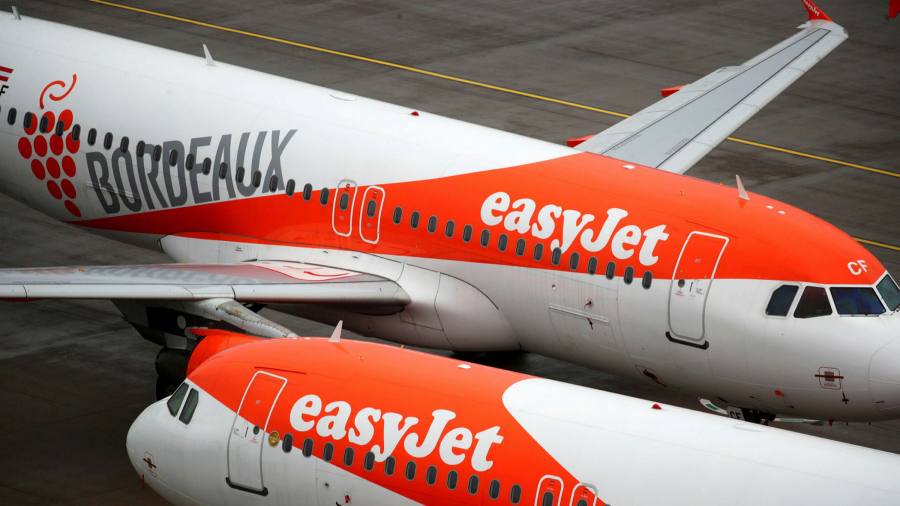[ad_1]
What price do you put on freedom? The answer is likely to have changed a lot over the past 12 months, unless you are an equities investor.
Holiday operators led the London market’s early gains on Tuesday as markets welcomed the government’s roadmap for lifting lockdown restrictions. Tui and easyJet took the opportunity to advertise a resultant surge in bookings — presumably from people who did not read the document, since international travel is barely mentioned. Its only concrete promise is for a taskforce to make recommendations by April on how to reopen borders for leisure travel. All speculation about vaccine passport schemes and reciprocal travel corridors remains just that.
The success of Britain’s vaccination programme has been cited as a reason for optimism. The UK is on track to meet its promise of offering all adults a jab by the end of July, with a current weekly vaccination rate of 5.4 per 1,000 of population. But with most of Europe lagging far behind there is still no clarity on where holidaymakers might be allowed to go. Few of the most popular short-haul destinations look likely to have vaccinated all vulnerable adults by summer, which ought to be the minimum threshold for lifting domestic restrictions.
So why did the roadmap’s publication power stocks including easyJet and British Airways owner IAG higher, as well as travel-reliant names such as Rolls-Royce, SSP and WHSmith? The timetable is little different from companies’ own guidance and is likely to slip if the data deteriorate. For all the talk of light at the end of the tunnel, the main benefit of state-endorsed milestones is that they give something tenable to put in a rights issue prospectus.
But then, equities had already priced in a return to normality. The FTSE 250, a rough proxy for the UK economy, has been flatlining since December, having rallied back to less than 5 per cent below its pre-pandemic peak. Tuesday’s demand for travel stocks was as likely to stem from a global rotation away from growth sectors as anything delivered by government.
It is the mechanic of markets to make a fool of the past. Each day’s price should be a weighted average of all possible futures, which makes what came before look either like irrational exuberance or histrionic pessimism. The FTSE 250 hit both extremes in the first three months of 2020, swinging from a record high to a seven-year low. Now it is holding steady back near exuberance levels as a wall of global tracker fund money switches into cyclical sectors such as travel that are over-represented in the UK market. Recent strength should not be confused with stunning prospects.
Soft soap
One of the many ironies of working from home revolves around the washing machine, writes Louise Lucas.
With the office maybe a flight of stairs away, it has never been easier to pop in a load of laundry between Zoom meetings — but homebound life means the average household is cycling through far fewer changes of clothing. Bad news for McBride, maker of private label household cleaners, which reported a fall in laundry sales of 13 per cent year-on-year at the interim.
London-listed McBride is used to ironies. It is an unsung hero of under-sink cupboards across the UK, Europe and Asia, but few shoppers will ever have heard its name. Cheaper own-brand cleaning liquids, sprays and pods should be obvious beneficiaries of economic downturns. But it has not always panned out that way. After the financial crisis of 2008, for example, private label failed to take sweeping share from branded goods. When UK shoppers did start buying more unbranded goods, it did little to help McBride, which issued a brace of profit warnings in 2014 and embarked on two rounds of staff cuts.
Interim results published on Tuesday show the group is on a more even keel. Constant currency revenues rose 1.7 per cent to £362.9m and adjusted ebitda was up sharply at £19m. More sales of sanitisers and the like offset the drop in laundry. Targeted margin improvement and increased returns, outlined at its investor day, provide more grist to the mill. Chuffed investors pushed shares almost 3 per cent higher in morning trade.
Yet the outlook is less cheering. Gross margins will suffer as the cost of inputs — everything from oil to high-density polythene — edges higher. Elevated freight costs are already taking a toll: equivalent to 8.2 per cent of sales in the first half, up from 7.8 per cent in 2019. On a reported basis, continued sterling strength will crimp overseas earnings.
Recent trends suggest shoppers are returning to brands. In Germany, where roughly a fifth of household cleaning goods by value bought by shoppers are own-brand, the proportion is declining. It has fallen from 21.3 per cent to 18.8 per cent over the past decade, according to Euromonitor. That reflects brands fighting back — through price cuts, promotions and innovations. Only the UK registered an increase — 40 basis points, to 17.2 per cent — in pandemic-stricken 2020. On the plus side, of course, Britain’s staggered end of lockdowns should at least mean more sales of laundry detergents.
Travel stocks: bryce.elder@ft.com
McBride: louise.lucas@ft.com
City Bulletin
Sign up to the City Bulletin newsletter for the latest company news. Every morning our UK equities reporter Bryce Elder covers the biggest business stories and delivers them straight to your inbox by 8am UK time.
[ad_2]
Source link






